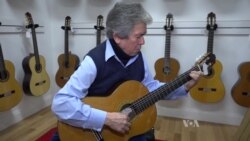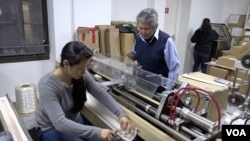Behind every great guitarist, is a lesser known artist.
Antonio "Tony" Acosta is a classical musician and business owner, but he also manufactures some of the finest nylon strings used in classical and flamenco guitar. His shop— Luthier Music Corporation —occupies 5,000 square feet of expensive prime real estate in lower Manhattan. Guitar prices in his store range anywhere from $450 for students to $50,000 for vintage classics.
But it is the strings he is most famous for. His customers praise the sound they produce, as well as how long they last. Among his list of celebrity clients are Argentine classical guitarist Jorge Morel and the late virtuoso Paco de Lucía, from Spain.
Luthier, now 30 years in, had a surprising start.
"My business — everything that I have — is because of soccer," declares Acosta, triumphantly.
Originally from Colombia, Acosta was raised in the U.S. from the age of eight. Despite his small stature, he played semi-professional soccer growing up, and used his savings — roughly $26,000 — to start his own business.
Weathering the recession
By 2008, Luthier sales had reached a peak of $2.5 million a year. Once the financial crisis hit, Acosta was forced to sell many retail stores. But the string he developed — which produced a unique tone and playability — pulled him through.
"When the economy went down, people were afraid to spend $10,000 on a guitar, $5,000 on a guitar," Acosta said. "It was understandable. But the string continued to hold the business."
Acosta was later forced to shut the doors of his original flagship store — a building he sold for $9.8 million. He has since placed greater focus on string manufacturing and guitar distribution across Europe, Asia and the Americas.
Quest for perfection
Today, business has picked up again. Luthier, Acosta says, could be much larger, but he does not want to increase production.
"Money — yes — we all need money and without it, we cannot have what we have, that is understood,” he said. “But let me put it this way, money does not attract me the way other people are attracted to it, you know?"
As long as the product is well done, Acosta adds, the money will follow. But quality remains his top priority.
"That's what I care [about] the most — that the product is perfect."
Acosta says the beauty of the guitar string industry is that there is room for everyone. Finding the perfect formula, he says, is personal — and every personality is valid.







